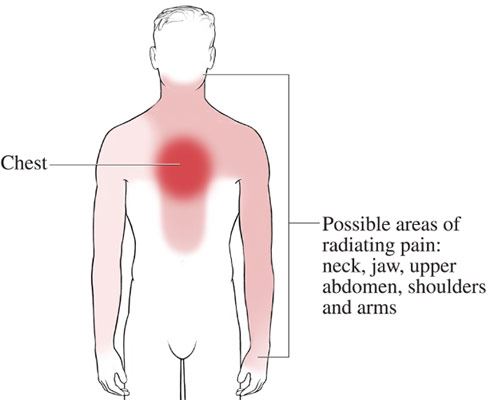Angina (Chest Pain)
Angina is a type of chest pain or discomfort caused when your heart muscle doesn’t get enough oxygen-rich blood. Angina is often described as squeezing, pressure, heaviness, tightness or pain in your chest. The discomfort can also occur in your shoulders, arms, neck, jaw, or back. It can be of cardiac or non-cardiac origin. Though angina is relatively common, it can be hard to distinguish it from other similar types of chest pain (e.g. pain or discomfort of indigestion), unless clinically diagnosed. Until that’s possible, angina should be treated as a serious medical condition.
Anyone who experiences an acute onset of chest pain or discomfort; shortness of breath; pain or discomfort in one or both arms, the neck, jaw or stomach; breaks out into a cold sweat, experiences nausea, vomiting or lightheadedness should call 911 immediately. The acute onset of these symptoms could indicate angina, a heart attack, or another cardiac-related condition.

Medical Illustration Copyright © 2019 Nucleus Medical Media, All rights reserved.
Types of Angina
- Stable Angina/Angina Pectoris: Angina pectoris is the medical term for chest pain or discomfort due to coronary artery disease (CAD). Stable angina is usually triggered by physical exertion. However, emotional stress, cold temperatures, heavy meals and smoking also cause it.
- Unstable Angina: Unstable angina or sometimes referred to as acute coronary syndrome causes unexpected chest pain, and usually occurs while resting. Unstable angina should be treated as an emergency as you could be having a heart attack.
- Variant (Prinzmetal) Angina: Prinzmetal’s angina almost always occurs when a person is at rest, usually between midnight and early morning. Prinzmetal’s angina is rare and usually occurs in younger patients. Emotional stress, smoking and use of cocaine may trigger this type of angina.
- Microvascular Angina: This type of angina may be a symptom of coronary microvascular disease (MVD). Coronary MVD is a type of heart disease that affects the heart’s smallest coronary artery blood vessels.
Causes of Angina
The most common cause of reduced blood flow to your heart muscle is coronary artery disease. However, women, in particular, are more commonly affected by microvascular disease (MVD). Either way, other conditions, traits or habits may also play a role in raising your risk for this disease. These conditions are known as risk factors.
Non-Modifiable Risk Factors: These factors are irreversible and cannot be changed. The more of these risk factors you have, the greater your chance of angina.
- Older age
- Family history/genetics
Modifiable Risk Factors: These factors can be modified, treated or controlled through medications or lifestyle changes.
- High cholesterol
- High blood pressure
- Long history of cigarette smoking and/or drug abuse.
- Diabetes: When your blood glucose, also called blood sugar, is too high.
- Obesity or having a body mass index “BMI” of 30 or greater.
- Eating too much saturated fat, trans fat and cholesterol such as red meats, whole milk, egg yolks, butter, cheese, fried foods, and packaged foods.
- Little to no physical activity.
- Extreme emotional stress.
Other conditions that contribute to angina:
- Blood vessel rupture or blood clots can lead to unstable angina.
- Coronary artery spams can also lead to Prinzmetal’s angina.
Symptoms of Angina
Common symptoms of angina include:
- Chest pain, fullness, discomfort or pressure.
- Discomfort or pain in one or both arms, the back, neck, jaw, or stomach.
- Lightheadedness/fainting
- Shortness of breath
- Nausea and/or vomiting
- Sweating
Diagnosis of Angina
All chest pain should be checked out by a health care provider. If you have chest pain, your doctor will want to find out whether it's angina and if it is, whether the angina is stable or unstable. If it's unstable, you may need emergency medical treatment to try to prevent a heart attack. Your doctor will most likely perform a physical exam, ask about your symptoms, and ask about your risk factors, and if there’s a history of heart disease in your family. After that, you may have one or more of the following diagnostic tests and procedures:
- Electrocardiogram (EKG/ECG)
- Stress test
- Blood tests
- X-Rays
- Cardiac catheterization
- Computed tomography (CT scan)
- Angiogram
Treatment of Angina
There are many options for angina treatment. The goals of treatment are to reduce the frequency and severity of your symptoms and to lower your risk of a heart attack and death. However, if you have unstable angina or angina pain that's different from what you usually have, such as occurring when you're at rest, you need immediate treatment in a hospital. Treatment options that could benefit anybody suffering from any type of angina include:
Lifestyle Changes
- Avoid smoking.
- Eat a heart-healthy diet.
- Exercise under the directions of your doctor.
- If you're overweight, talk to your doctor about weight loss options.
- Manage your stress.
- Limit your alcohol consumption to 1 drink per day for women and 2 drinks per day for men.
- Make and keep appointments to see your doctor for routine checkups and follow-up tests.
Medications
- Thrombolytic therapy is the administration of drugs called “lytics” or “clot busters” to break up or dissolve blood clots.
- Beta blockers will help reduce your blood pressure.
- Chest pain medications will help relax your blood vessels and allow for blood to flow easier.
- Statins will help reduce the level of cholesterol in the blood.
